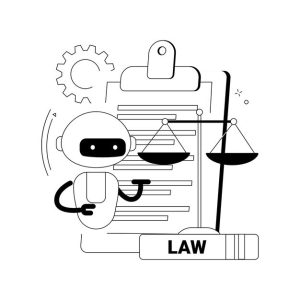Traditional practice of legal document drafting required prolonged meticulous effort. Legal professionals and lawyers dedicate extensive time to study documents then create and afterward revise and harmonize their work to verify precision and follow regulations. The rapid development of artificial intelligence technologies leads to fundamental changes in this professional sector. AI drafting technology currently optimizes legal workflows while improving accuracy of documents and expanding operational speed within the legal domain.
This article evaluates how AI legal drafting transforms how legal experts handle the creation and management of legal documents as well as their drafting and review processes.
The Role of AI in Legal Document Drafting
Law practice has experienced significant innovations through AI technology and particularly through its processes of building and governing legal documents. The use of AI-powered tools helped cut through the workload of legal professionals by providing assistance in research tasks and delivering automatic contract production. AI uses four essential approaches to transform the drafting process of legal documents.
1. Enhanced Legal Research Capabilities
Compliance with existing legal requirements as well as previous judicial standards requires extensive research during the drafting of legal documents. Historically law professionals performed lengthy labor-intensive manual tasks by reviewing massive data sources to identify appropriate statutes and case laws. The process of legal research experienced revolutionary transformations through AI automation.
AI technology conducts rapid analysis of extensive legal datasets to recognize essential judicial decisions coupled with corresponding statutory guidelines related to particular legal cases. The artificial learning and natural language processing features on Casetext platforms supply instant legal insights to support lawyers in developing solid legal arguments. Modern AI technology allows legal specialists to conduct extremely fast yet accurate research of legal documents with current standards of compliance.
2. AI-Powered Contract Generation
People who draft contracts must combine legal expertise and knowledge with proficient writing ability. People who do not excel in legal writing can use AI-driven contract generation platforms such as Legit AI to create professional legal documents efficiently.
These tools need few user inputs that include essential contract information as well as party names and jurisdiction details among others. The AI tool utilizes these provided inputs to produce a properly structured legal document that adheres to legal standards.
The first draft produced by AI needs further examination from legal experts who will adjust it to meet particular specifications. The robot-generated draft allows legal professionals to direct their attention toward significant legal points instead of performing repetitive manual tasks.

3. Streamlining Compliance and Risk Management
Risk assessment beside compliance functions as important elements when drafting legal documents. Historically legal teams performed manual document evaluations as a way to verify industry compliance but this method consumed extensive time while introducing multiple human errors. AI-based software tools perform automated compliance reviews which enable attorneys to recognize regulatory hazards while upholding compliance rules.
AI legal drafting tools perform document scans to identify inconsistencies and both locate and propose modifications from updated legal standards. The contract review engine offered by Legitt AI examines legal clauses to validate their compliance with data protection statutes and financial regulations as well as other mandatory legislations. The system utilizes artificial intelligence to rate documents by their completeness along with their effectiveness in readability and accuracy as well as compliance standards.
The automated compliance checking enabled by AI system reduces legal disputes and delivers better legal documentation quality which enables professionals to work on core strategic decisions.
4. Automated Summarization of Legal Documents

Long complicated legal documentation requires significant effort to extract essential details with efficiency. The combination of artificial intelligence technology with summarization tools enables quick document processing for long legal texts with output generation of targeted summaries that maintain key information and make the text more accessible to readers.
Editpad and similar AI tools employ natural language processing to extract vital document areas which the system then transforms into simple readable content. Summarized information becomes readily available to lawyers because this feature examines documents efficiently so they no longer need to read long documents in depth.
The use of AI for document summarization enables lawyers to focus on crucial tasks like decision-making and analysis because the system handles extensive legal text scanning needs.
Ethical Considerations in AI Legal Drafting
AI legal drafting delivers multiple advantages to legal practice but professionals need to address ethical issues that may appear in AI applications. Two vital aspects need attention before using AI systems to draft legal documents.
1. Addressing Bias in AI-Generated Legal Content
AI tools need extensive data collections as a basis to create legal documents. The AI systems will output biased information when fed biased datasets. The issue becomes particularly significant because legal procedures function best with procedures that maintain complete fairness and impartiality.
When implementing AI programs into legal work professionals need to use them as helpers instead of allowing AI tools to create independent legal decisions. Thorough reviews of AI-generated legal content maintain objective documentation that is accurate and ethically sound.
2. Ensuring Data Privacy and Security
Legal documents contain confidential knowledge about people as well as corporate entities and their activities. AI legal drafting tools create the risk of exposing confidential data because of both security system weaknesses and.database breaches.
For adequate protection of sensitive data legal professionals must consider tools with security features based on encryption and data anonymization procedures. Laws require legal professionals to select data processing platforms following the guidelines of industry-standard security protocols to ensure client confidentiality.

Final Thoughts
The legal document drafting process experiences a transformative shift because AI delivers efficiency alongside accuracy in combination with improved compliance capabilities. Programs powered by AI simplify legal research operations while they generate documents automatically and handle compliance processes and convert complex legal documents into concise summaries. Law professionals need to stay focused on ethical considerations like bias detection as well as data security risks which exist with AI legal drafting systems.
AI implementation under responsible parameters enables law firms and their individual staff to improve their operational efficiency without compromising legal document authenticity. The evolution of AI technology will result in stronger prominence for AI in legal document drafting as it provides exceptional efficiency to legal operations.










